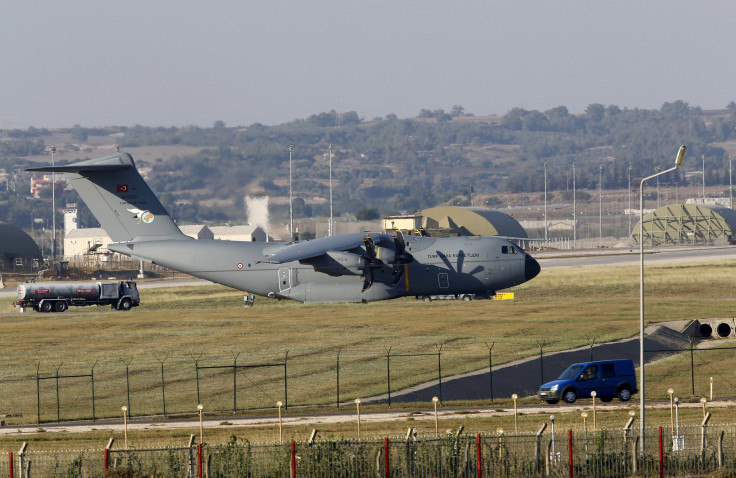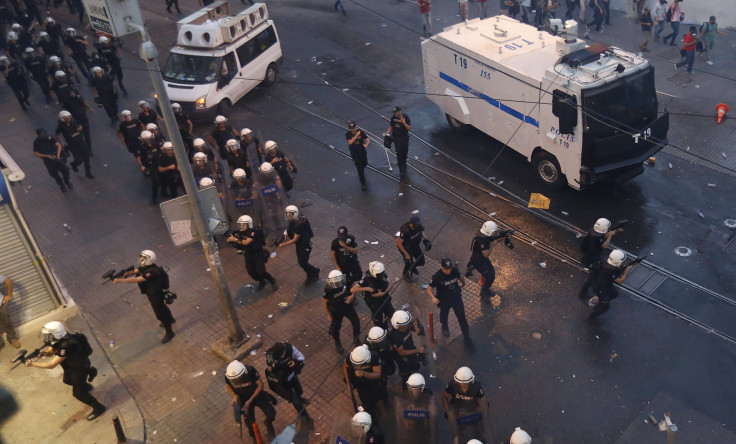Confusion In Turkey As Government Wages Different Offensives on ISIS, Kurds In Iraq And Syria

Dozens of young men and women, many of whom are Kurdish, lined the streets in neighborhoods throughout Istanbul Saturday to rally against what they say is a deepening relationship between their government and the Islamic State group. The demonstrators shouted at police officers that had set up barricades in the streets -- some throwing bottles and litter at the officers. The police responded with tear gas and handcuffs, sources said.
Activists say the scene in Istanbul is representative of the discontent taking place throughout the country. Residents of Turkey, from Istanbul to Hatay province in the eastern part of the country, say they are trying to figure out how their country went from being one of the few places people fleeing wars in the Middle East could find refuge to one that is now involved in two different military offensives in two different countries and has launched a nationwide counterterrorism operation that resulted in the arrest of nearly 300 Turks on Friday alone -- a number that reached 600 by Saturday.
“No one knows what to believe,” one Kurdish activist in Suruc said, claiming that the recent offensives launched by Turkey have split the population down the middle. “It is chaos.” Some say Turks are trying figure out whether they can trust their government and its vow to keep the country safe.
“One set of people is under the influence of patriotism and fully supports the government, saying that the attacks on the Kurdish militants have been long overdue,” a local journalist in Ankara told International Business Times on condition of anonymity. “The other side says this was President Erdogan’s plan from the beginning: to use all his guns, including detentions, restraining Kurdish political parties’ privileges and bombing of Kurdish forces as a way to create an environment of fear. All so he can keep his presidency dream alive.”
Many of the people protesting in Istanbul -- and other major towns in the eastern part of the country -- are convinced that their government is to blame for the massive terrorist attack that killed 32 people in Suruc July 20. Some Kurdish activists say that the Turkish government knew about the attack and did nothing to stop it. The government, they say, is working with ISIS to rid Turkey of the Kurdish political parties and militant groups, an extension of a bloody war between Ankara and the Kurds that seems to be ramping up again.
In retaliation, the People’s Defence Force (HPG) – the armed wing of the Kurdistan Workers Party (PKK) – claimed responsibility for the killing of two police officers in Ceylanpınar, a town on the Syrian border, in retaliation for the Suruc bomb.

The attack in Suruc and the following assassinations led to the escalation of fighting between the Turkish army and the Islamic State group, as well as the breakdown of a two-year ceasefire between Ankara and the armed wing of the PKK, a designated terrorist organization. The peace process between Ankara and the Kurds began in 2012 in an attempt to end a bloody conflict that killed more than 40,000 people over 30 years.
Unlike most military offensives or wars, the events instigated by Turkey in Iraq and Syria lack a common enemy. Turkey is fighting both ISIS and the PKK. That has Turks split and nationalism at an all-time low, the journalist in Ankara said.
The confusion caused the Turkish lira to weaken nearly 4 percent on Friday. The lira fell to 2.7500 against the US dollar by Friday afternoon, marking a 3.6 percent loss on the week.
Over the past several days, the Turkish army has engaged in a shootout with ISIS militants in Syria, and bombed PKK and ISIS targets in Iraq. In addition to the army’s military interventions, thousands of Turkish police officers on Friday rounded up suspected terrorists, those they claim are associated with the PKK and ISIS, and detained them in centers across the country, sources said.
Turkey, which is part of the U.S.-led coalition to fight ISIS, has stayed in the background of the wars in Iraq and Syria. It has for years sat back on its heels, refusing to enter Syria to fight the Sunni militant group without more support from other coalition members. Meanwhile, reports have emerged that Ankara is actually aiding the fight by allowing for the free flow of foreign fighters and weapons through its borders.
The U.S. has previously tried to push Turkey, a NATO ally, to do more to help in the fight against ISIS given its proximity to the conflict, but President Erdogan continuously shrugged off any responsibility unless the international community did more to ensure Turkey's safety. At the World Economic Forum last year, he said: “Nobody seems to say or ask how they can help Turkey. There are also social ramifications, but no one else seems to be concerned,” he said, adding Turkey would “take the necessary steps to ensure the security of its border.”
Erdogan then blamed other coalition members for not providing the support needed to aid the humanitarian crisis on Turkey’s border. For more than three years, Turkey has hosted hundreds of thousands of refugees fleeing the civil war in Syria. There are now more than 1.5 million Syrian refugees in Turkey, Erdogan said, and the majority of the funding of refugee aid and assistance has come from Turkey, not the U.N.
Now, though, it seems Turkey has changed its mind on engaging in fighting in Iraq and Syria. Not only is it taking the initiative to launch attacks against ISIS, it is also allowing the U.S. to use one of its airbases to launch airstrikes against ISIS targets in Iraq and Syria.
It is still unclear whether Turkey asked for permission from the coalition before engaging in Iraq and Syria, though Erdogan and U.S. President Barack Obama did speak via telephone on Wednesday, Reuters reported.
Turkey told the United Nations on Friday that it started conducting air strikes in Syria against ISIS militants because the Syrian government was not capable or willing to tackle the Sunni militant group. The Turkish army's offensive in Iraq, though, is a different operation as it is primarily focused on hitting Kurdish targets.
Foreign media has reported that Iraqi Kurdish President Barzani did not approve the mission and has asked Turkey to pull out of the country. But Turkish state media is currently reporting that the Iraqi Kurdish government supports Turkey's mission.
“Strikes were carried out on targets of the Daesh (ISIS) terrorist group in Syria and the PKK terrorist group in northern Iraq,” the Turkish prime minister’s office said in a statement Saturday, adding that all anti-terrorism operations were “carried out indiscriminately against all terrorist groups”.
The People's Democratic Party, the main Kurdish political party in Turkey, called for peace Saturday.
"We underline again how very much Turkey needs peace and a solution [to the Kurdish issue]. It is possible to solve our societal, historical and political problems through mutual dialogue, negotiations and through the development of democracy,” a statement said. “The increase and perpetuation of violence will not bring a lasting, democratic and egalitarian solution for any side, or any part of society.”
© Copyright IBTimes 2024. All rights reserved.





















